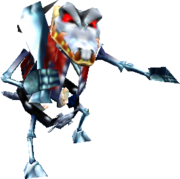Skeleton Kremling
It has been suggested that this page be moved to Skeleton Kremling. Reason: Name comes from Nintendo's official strategy guide which is higher priority than Prima (discuss)
| Skeleton Kremling | |||
|---|---|---|---|
 Bones as it appears in Donkey Kong 64 | |||
| First appearance | Donkey Kong 64 (1999) | ||
| Variant of | Kritter | ||
| |||
Bones[1], also called Skeleton Kremlings[2] are skeletal Kritter enemies in Donkey Kong 64. Bones appear in Fungi Forest (in the nighttime), Creepy Castle, and in two of the later Battle Arena Pad stages of DK Isles and Creepy Castle. Unlike Kritters, Bones attack by swinging their bone club at the player character, but take one to three hits to defeat; this is based on the strength of the Kongs' direct attacks, with weaker attacks merely removing the Bones' head and left arm, while stronger attacks can defeat them without removing their body parts. Upon being defeated, Bones lose balance and collapse on the ground. A Bones is instantly defeated from an Orange, costing the Bones its head and left arm in the process, or from a musical instrument move.
Profiles
- Prima guide: Even without a head, these guys keep swinging, so keep your distance after hitting this toe. Punch-and-run is good tactic against these sword-bearing skeletons.[1]
Names in other languages
| Language | Name | Meaning | Notes |
|---|---|---|---|
| Japanese | クリプト[3] Kuriputo |
Krypt |
References
- ^ a b Barton, Jeff, Mario De Govia, and Donato Tica (December 1, 1999). Donkey Kong 64 Prima's Official Strategy Guide. Prima Games (American English). ISBN 0-7615-2279-4. Page 15.
- ^ Bihldorff, Nate, Jason Leung, and Drew Williams (1999). Donkey Kong 64 Player's Guide. Nintendo of America (American English). Page 82.
- ^ 「ドンキーコング64任天堂公式ガイドブック」 (Donkey Kong 64 Nintendo Kōshiki Guidebook). Shogakukan (Japanese). Page 13.
| Kremlings | |
|---|---|
| Characters | Congazuma • Cranky K. Rool • Draglinger • General Klump • Giant Viking Kremling • Green Kroc • Jr. Klap Trap • Junklomp • K. Lumsy • Kalypso • Kaptain Skurvy • Kass • Kerozene • King K. Rool • King Kut Out • Kip • Klubba • Kleever • Kludge • Krunch • Krunch's mother • Krusha • Krushy • Kudgel • Kutlass • Mega Amp • Okusan • Quint Skurvy • Resident demon |
| Species | Bazuka • Ghost • Kaboing • Kaboom • Kackle • Kannon • Kasplat • Klampon • Klank • Klaptrap • Klasp • Klinger • Kloak • Klobber • Klomp • Klump • Knocka • Kobble • Koin • Koindozer • Kopter • Kosha • Kracka • Krash • Kremling (boater) • Kremling cop • Krimp • Kritter • Kroc • Krockhead • Krook • Krumple • Kruncha • Krusha • Kuchuka • Kuff 'n' Klout • Kutlass • Re-Koil • Robokremling • Rock Kroc • Shroom • Skeleton Kremling • Skidda • Super Team goalie |